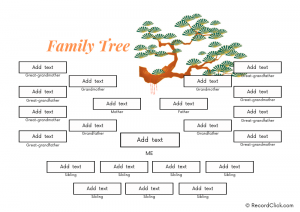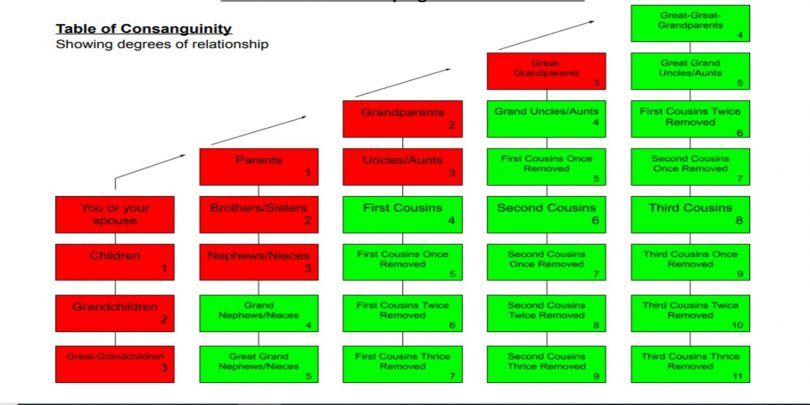Table of Contents
Inheriting from a relative is possible if you prove eligibility for the estate. However, before you lodge that complaint in a probate court, you must understand the legal intricacies and how they apply to your case.
This guide helps you determine eligibility as an heir to your relative’s estate and the legal process to transfer the estate to you and other heirs.
Key Takeaways
- Pursuing inheritance from a distant relative can be long and tedious, especially when there’s no will or known heirs.
- The most important thing is understanding the inheritance laws in the respective jurisdiction and your place as a potential heir.
- To navigate these intricacies and avoid disappointments, consider seeking services from a professional genealogist and a legal expert.
What Makes You Eligible to Inherit from A Relative?

Family tree
Your eligibility to inherit from a distant relative depends on whether the decedent left a will. If so, you may have no place as a distant relative.
The surviving spouse and the decedent’s children are the only people allowed to claim an inheritance despite the presence of a will.
So, the lack of a valid will or a will that fails to cover all the assets is the only opportunity to assert your eligibility to inherit from a distant relative. Typically, issues of intestacy (dying without a will) lead to a probate process where intestate succession laws come into play.
Although the laws may vary with jurisdiction, they follow a similar pattern in classifying relatives and their eligibility to inherit.
The first-class relatives include the surviving spouse, children, grandchildren, etc.
The second class of eligible relatives are the parents and siblings, while the third are distant relatives such as aunts, cousins, uncles, grandparents, etc.
It’s worth noting that states have special rules that limit inheritance rights concerning the decedent. For instance, Texas intestacy laws, allow half-relatives (related to the decedent by one parent) to inherit only if there are no known whole relatives (related by both parents).
Other states like Illinois and Massachusetts limit the distance of relatives that should inherit at 15 and 10 degrees removed, respectively.
In addition, the probate court may apply the concept of “excluding prior classes” that grants the estate to the closest relatives. In this case, distant relatives may not inherit when the decedent has surviving closer relatives.
For example, in intestacy succession with only a living parent and an aunt, the parent excludes the aunt from inheriting. In the same way, if there’s only a living grandparent and a cousin, they share the inheritance equally since they belong to the same class of relatives.
Therefore, it’s imperative to understand what the laws in your jurisdiction say about your case.
The Legal Process of Inheriting from A Relative

Probate Court Process
Suppose the decedent died without a valid will or left out some of their assets in the will. In that case, you may have to undergo the intestate succession process to claim the inheritance as a relative. Besides following the state laws, the court requires you to prove your relationship with the decedent in the kinship proceedings.
What Are Kinship Proceedings?
Kinship proceedings are held in a probate court to protect all heirs and ensure that the estate is distributed according to the laws.
Usually, the court requires all applicants to supply extensive evidence of their kinship with the decedent. Common documentation and evidence may include a comprehensive genealogy report, DNA tests, and birth and/or marriage certificates.
See our Step-by-Step Guide on The Probate Court Process.
For Heir Search, Estate Settlement, or a Probate Search? See RecordClick’s Heir Research Services, Costs, And Expectations.
Challenges In Inheriting from A Relative
Inheriting from a relative can be complicated and stressful, especially if there are unclear documents or conflicting claims. For this reason, you need to understand the best ways to address them for the best results.
Some of the common challenges include:
- Proving Your Heirship Case: Intestacy laws require that applicants carry the burden of proof through documentation and evidence. So, you have to unwind any complex family tree involving the decedent and show a reliable link to you.The only way to overcome this challenge is to hire a professional genealogist to create an accurate family tree, gather documents, and present your report in the probate court.
- Searching for Other Potential Heirs: Intestacy laws require that all heirs be established and respected, meaning that you need to check if other distant relatives could also qualify as rightful heirs.In this case, a genealogist will help in a comprehensive heir search and avoid possible future litigations or disputes into your heirship.
- Dealing With Creditors and Tax Collectors: Any claim against the estate from tax authorities and creditors could significantly impact your inheritance share. Moreover, some of these layers could take advantage of the situation to exaggerate the amounts the decedent owed them.A legal expert may be helpful when you want to identify, verify, and negotiate any claims.
- Finding Hidden or Unknown Assets: Insurance policies, cash, bank accounts, and stocks that are not easily accessible or discovered may complicate the inheritance process. Since the probate court requires all assets to be identified and valued, the process may take longer than expected.
This guide on How To Find Hidden Assets In Probate Cases has all the solutions you may need.
What Professionals Are Crucial When Inheriting from A Relative?

Genealogists and Legal Experts are the game-changers
Inheriting from a relative can be daunting, albeit rewarding, especially when you incorporate a legal expert and a professional genealogist.
A genealogist will help you in the following ways;
- Heir Search: Genealogists are experts in family history research with access to vast networks, databases, and tools to accurately detail your lineage. This expertise can be helpful when you want to establish, verify, or prove your identity and relationships.
- Court Presentation: Genealogists are better placed to present any family relationship documents and evidence before the probate court to support your heirship claims.
- Documenting Your Family Heritage: Besides conducting family history research, genealogists create visual presentations of your familial connections through fan charts and family trees. This presentation helps you understand the lineage and makes the history easily preservable.
While genealogists are a valuable resource in inheritance cases and heir searches, they may not be the best to provide legal advice or representation. Therefore, you should also consider consulting an attorney. Here’s why;
- Review Trusts and Will: Legal experts can review any will and determine its validity or admissibility in a probate court. Besides, they can advise you on the best route for your case and how to navigate the probate court process.
- Handling the Estate: Legal experts are the chief advisors when managing inherited assets and transferring everything to your name. In addition, they provide guidance on resolving conflicts and paying taxes and debts.
- Addressing Your Concerns: A legal expert will answer questions about the probate process and inform you of options and consequences.
Ask The Experts
Inheriting from a relative can be life-changing, but the process requires careful planning. The only way to ensure a smooth and successful probate process is by incorporating legal experts and genealogists from the first step.
These experts will help form the basis of your application and advise on the possible outcomes depending on the circumstances.
If you want to learn more about inheriting from a relative in your unique case, contact RecordClick today for a free consultation and a breakdown of what you need to set sail.








